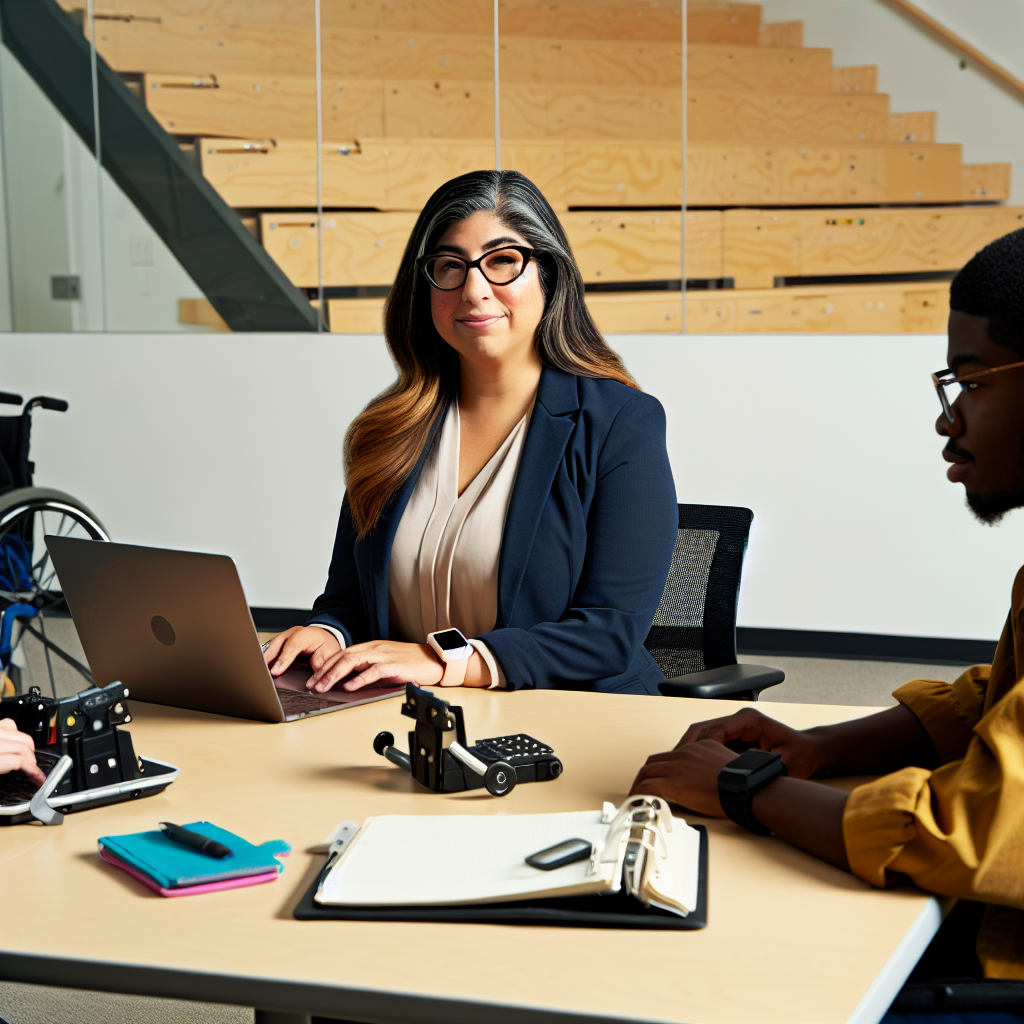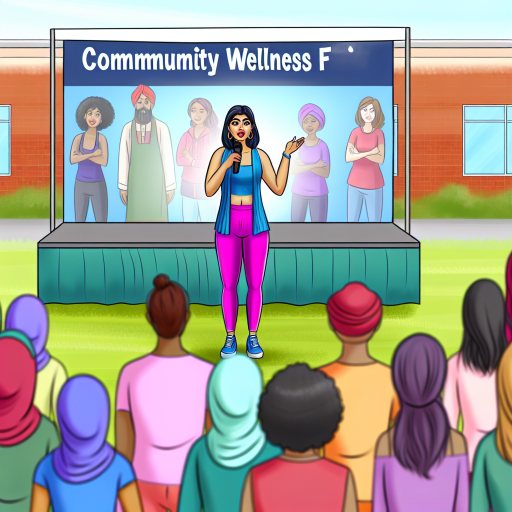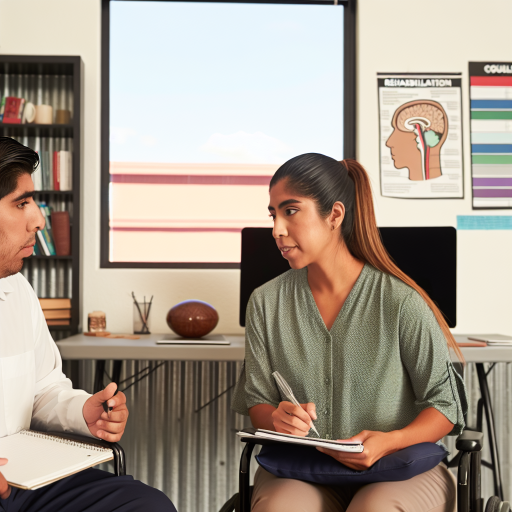Introduction
A Disability Services Coordinator plays a vital role in assisting individuals with disabilities.
Their support is crucial in ensuring access to necessary services and accommodations.
In this blog post, we will delve into the daily tasks of a Disability Services Coordinator.
Job responsibilities and duties of a Disability Services Coordinator
As a Disability Services Coordinator, you play a crucial role in supporting individuals with disabilities in various aspects of their lives.
Your job responsibilities and duties are diverse and encompass a wide range of tasks that aim to enhance the quality of life and opportunities for individuals with disabilities.
Support and advocacy for individuals with disabilities
One of the primary responsibilities of a Disability Services Coordinator is to provide support and advocacy for individuals with disabilities.
This involves working closely with individuals to understand their needs, challenges, and goals, and advocating on their behalf to ensure they have access to the necessary resources and services to help them thrive.
Whether it’s assisting individuals in accessing disability accommodations, connecting them with support services in the community, or advocating for their rights in educational or workplace settings, you serve as a critical advocate and ally for individuals with disabilities.
Coordinate accommodations and services for students with disabilities
Another important aspect of your role is to coordinate accommodations and services for students with disabilities.
This involves working with students, faculty, and staff to develop individualized accommodation plans that address the specific needs of each student.
From arranging for assistive technology and accessible learning materials to coordinating sign language interpreters and note-taking services, you play a key role in ensuring that students with disabilities have equal access to educational opportunities and resources.
Collaborate with faculty and staff to ensure inclusive learning environments
In addition to coordinating accommodations and services, you also collaborate with faculty and staff to ensure that inclusive learning environments are created for students with disabilities.
This involves working with instructors to promote awareness of disability issues, provide training on inclusive teaching practices, and facilitate discussions on creating accessible and inclusive classroom environments.
By working closely with faculty and staff, you help to foster a supportive and inclusive campus culture where students with disabilities feel valued, respected, and empowered to succeed academically and personally.
Your work is essential in ensuring that individuals with disabilities have the support and resources they need to thrive and succeed in all aspects of their lives.
Communication and Outreach Efforts
As a Disability Services Coordinator, effective communication is crucial in ensuring that students, families, and staff are aware of and can access available services.
Here are some key tasks related to communication and outreach:
- Communicate with students, families, and staff regarding available services
- It is essential to maintain an open line of communication with all stakeholders to ensure that they are informed about the various resources and accommodations available to support students with disabilities. This can involve sending out regular updates via email, holding informational meetings, or simply being available to answer any questions or concerns that may arise.
- Organize informational sessions and workshops to raise awareness
- Hosting informational sessions and workshops can be a great way to educate the campus community about the services offered by the Disability Services office. These events can cover topics such as available accommodations, disability etiquette, and self-advocacy skills. By raising awareness, you can help create a more inclusive and supportive environment for students with disabilities.
- Collaborate with community organizations to provide resources and support
- Networking and building partnerships with community organizations can help expand the range of resources and support available to students with disabilities. By collaborating with external agencies, you can tap into additional services such as counseling, job placement assistance, or mobility training. These partnerships can also help create a more seamless transition for students as they move beyond the campus environment.
Effective communication and outreach efforts are essential for a Disability Services Coordinator to ensure that students with disabilities have access to the support and resources they need to succeed both academically and personally.
Learn More: Essential Skills for a Successful Community Health Worker
Transform Your Career Today
Unlock a personalized career strategy that drives real results. Get tailored advice and a roadmap designed just for you.
Start NowCase Management and Documentation
As a Disability Services Coordinator, one of the essential daily tasks is managing cases and documenting all student accommodations and services provided.
This involves maintaining detailed records to ensure that each student receives the necessary support to succeed.
Maintain Detailed Records
- Document each student’s specific accommodations and services
- Include dates, types of services, and any modifications made
- Keep track of any changes or updates to accommodations
By maintaining detailed records, coordinators can easily reference past accommodations and track a student’s progress over time.
Track Student Progress
- Monitor how students are utilizing their accommodations
- Assess the effectiveness of the services provided
- Adjust accommodations as needed based on progress
Tracking student progress is crucial in ensuring that accommodations are tailored to their individual needs and are helping them succeed academically.
Ensure Compliance with Legal Regulations
- Stay up-to-date on all legal requirements and regulations
- Review and follow guidelines set by ADA and other laws
- Ensure that all accommodations meet legal standards
Compliance with legal regulations is essential to protect the rights of students with disabilities and provide them with equal opportunities for success.
Effective case management and documentation are key components of a Disability Services Coordinator’s daily responsibilities.
By maintaining detailed records, tracking student progress, and ensuring compliance with legal regulations, coordinators can provide the best possible support to students with disabilities.
You Might Also Like: Collaboration Between Family Support Workers and Other Professionals
Individualized support and accommodations
As a Disability Services Coordinator, one of the primary daily tasks involves providing individualized support and accommodations for students with disabilities.
This aspect of the role requires careful planning, coordination, and advocacy to ensure that students have access to the resources and accommodations they need to succeed in their academic pursuits.
- Develop personalized accommodation plans: One of the key responsibilities of a Disability Services Coordinator is to work with students with disabilities to develop personalized accommodation plans. These plans outline the specific accommodations and support services that students may require to remove barriers to their learning and participation in academic activities.
- Assist students in accessing necessary resources and support services: Another important aspect of this role is to assist students in accessing the necessary resources and support services available to them. This may involve connecting students with academic support services, assistive technology, counseling services, or other accommodations based on their individual needs.
- Advocate for reasonable accommodations: Disability Services Coordinators play a crucial role in advocating for reasonable accommodations for students in both academic and non-academic settings. This may involve working closely with faculty and staff to ensure that students with disabilities have equal access to educational opportunities and are not discriminated against based on their disability.
By developing personalized accommodation plans, assisting students in accessing necessary resources, and advocating for reasonable accommodations, these professionals play a vital role in promoting inclusivity and accessibility for students with disabilities in educational settings.
Discover More: How to Engage Corporate Volunteers
Crisis Intervention and Support
Providing immediate support in emergency situations is a crucial aspect of a disability services coordinator’s role.
When a crisis arises, it is essential to respond promptly and effectively to ensure the safety and well-being of individuals with disabilities.
Collaboration with Mental Health Professionals and Campus Resources
Working in collaboration with mental health professionals and utilizing campus resources is vital in crisis intervention.
By partnering with experts in the field, disability services coordinators can ensure that individuals receive the appropriate level of support and care.
Implementation of Crisis Management Plans and Protocols
Developing and implementing crisis management plans and protocols is essential for effectively handling emergency situations.
Disability services coordinators should establish clear guidelines and procedures to follow in times of crisis, ensuring a coordinated and efficient response.
By having these plans in place, disability services coordinators can ensure that all staff members are aware of their roles and responsibilities during a crisis.
This minimizes confusion and ensures a swift and appropriate response.
Transform Your Career Today
Unlock a personalized career strategy that drives real results. Get tailored advice and a roadmap designed just for you.
Start NowFind Out More: Essential Skills for Successful Case Management

Training and Professional Development
Staying updated on best practices and legal requirements in disability services is crucial.
This involves keeping up with changes in legislation, guidelines, and innovative approaches to serving individuals with disabilities.
By constantly updating your knowledge, you can ensure that the services you provide are in compliance with the law and are of the highest quality.
Another important aspect of your role is providing training for faculty and staff within your organization.
It is essential to equip them with the skills and knowledge needed to effectively accommodate individuals with disabilities.
This could involve conducting workshops, creating resources, and offering guidance on inclusive practices.
By educating the people you work with, you can help create a more inclusive and supportive environment for individuals with disabilities.
Furthermore, attending conferences and workshops related to disability services is an excellent way to enhance your knowledge and skills.
These events offer valuable opportunities to learn from experts in the field, network with other professionals, and stay up-to-date on the latest research and trends.
By participating in professional development activities, you can continuously improve your practice and provide better support to individuals with disabilities.
Training and professional development are essential components of being a successful Disability Services Coordinator.
By staying informed, providing training for others, and taking advantage of professional development opportunities, you can enhance your ability to support individuals with disabilities and make a positive impact in your role.
Collaborative partnerships and networking
Partner with other departments and organizations to improve services.
Advocate for disability rights and accessibility on campus and in the community.
Network with professionals in the field to share resources and best practices.
As a Disability Services Coordinator, one of the key responsibilities is to establish collaborative partnerships and networks to enhance the support services offered to individuals with disabilities.
By working with other departments and organizations, we can better address the diverse needs of our students and promote inclusivity on campus.
Partnering with academic departments allows for a more holistic approach to supporting students with disabilities.
Collaborating with faculty and staff ensures that accommodations are implemented effectively.
Transform Your Career Today
Unlock a personalized career strategy that drives real results. Get tailored advice and a roadmap designed just for you.
Start NowStudents have equal access to educational opportunities.
This teamwork fosters a more inclusive learning environment where students feel supported and empowered to succeed.
Additionally, advocating for disability rights and accessibility both on campus and in the community is essential.
By raising awareness about the importance of accessibility and promoting a culture of inclusivity, we can create a more welcoming environment for individuals with disabilities.
This advocacy extends beyond campus boundaries, as we strive to ensure that our students have equal opportunities in all aspects of life.
Networking with professionals in the field is also crucial for staying informed about best practices and resources.
By connecting with other disability services coordinators, educators, and advocates, we can share ideas and strategies for supporting individuals with disabilities.
This collaboration allows us to learn from each other and continuously improve the services we provide.
Building collaborative partnerships and networks is vital for enhancing the support services offered to individuals with disabilities.
By working together with other departments, advocating for accessibility, and networking with professionals, we can create a more inclusive and supportive environment for our students.
Role of Disability Services Coordinators
After diving into the daily tasks of a Disability Services Coordinator, it is evident that their role is multifaceted.
They engage in a variety of responsibilities such as coordinating accommodations, supporting students with disabilities, and collaborating with faculty and staff to ensure inclusive environments.
Disability Services Coordinators play a crucial role in advocating for individuals with disabilities and striving for equal access to education and resources.
Their work has a significant impact on the lives of those they support, empowering them to achieve their full potential.
As we reflect on the importance of their work, it is essential to recognize and appreciate the dedication and commitment required in this field.
Everyone can contribute to promoting inclusivity and accessibility by learning more about disability services and advocating for equitable opportunities in our communities.
Additional Resources
Social and Community Service Managers : Occupational Outlook …
Georgia Department of Human Services Division of Aging Services




